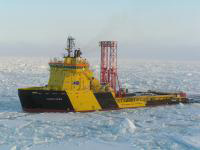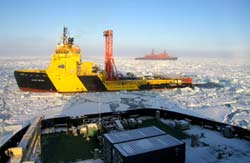New scientific results for the Late Cretaceous greenhouse indicate radically different climatic mechanisms operating about 75-90 million years ago compared to the ones that control today’s climate. The study, published on 29 May 2006 in “Palaeogeography, Palaeoclimatology, Palaeoecology” as part of a special issue on “Causes and Consequence of Marine Organic Carbon Burial Through Time” by Sascha Floegel from the IFM-GEOMAR in Kiel/Germany and Thomas Wagner from the University of Newcastle upon
In vast remote taiga not far from the Yenisei river, where one can get only by helicopter within one third of the year, the construction of a huge 300-meter high mast is to be completed this summer. In the underground shelter under the mast, a research laboratory will be located, which is stuffed with the most contemporary scientific equipment. Researchers needed that in order to thoroughly investigate who or, more precisely, what is responsible for the greenhouse effect, where oxygen, carbonic ac

Key findings published in Nature
A group of ocean-drilling research scientists that explored the Arctic Ocean subseafloor in Fall 2004 have released new findings in a report to be published in Nature on June 1. The report, supported by Integrated Ocean Drilling Program (IODP) research operations, contains analyses of subseafloor sediment samples gathered from 430 meters beneath the Arctic Ocean, near the North Pole. To recover the sediments that yielded the prehistoric climate reco

Arctic ice formed about 45 million years ago – roughly 14 million years ahead of previous predictions – according to new research published in Nature. An international team of scientists, including Brown geologist Steven Clemens, says this startling evidence shows that glaciers formed in tandem at Earth’s poles, providing important insights into global climate change.
For the first time, scientists have pulled up prehistoric geologic records from the frigid vault of the Arct
Comfortable living is not why so many different life forms seem to converge at the warmer areas of the planet.
Writing this week in the Proceedings of the National Academy of Sciences, scientists say higher temperatures near the equator speed up the metabolisms of the inhabitants, fueling genetic changes that actually lead to the creation of new species.
The finding – by researchers from the University of Florida, the National Center for Ecological Analysis and Synthesis
Human induced climate change, rather than naturally occurring ocean cycles, may be responsible for the recent increases in frequency and strength of North Atlantic hurricanes, according to Penn State and Massachusetts Institute of Technology researchers.
“Anthropogenic factors are likely responsible for long-term trends in tropical Atlantic warmth and tropical cyclone activity,” the researchers report in an upcoming issue of the American Geophysical Society’s EOS.
Michael